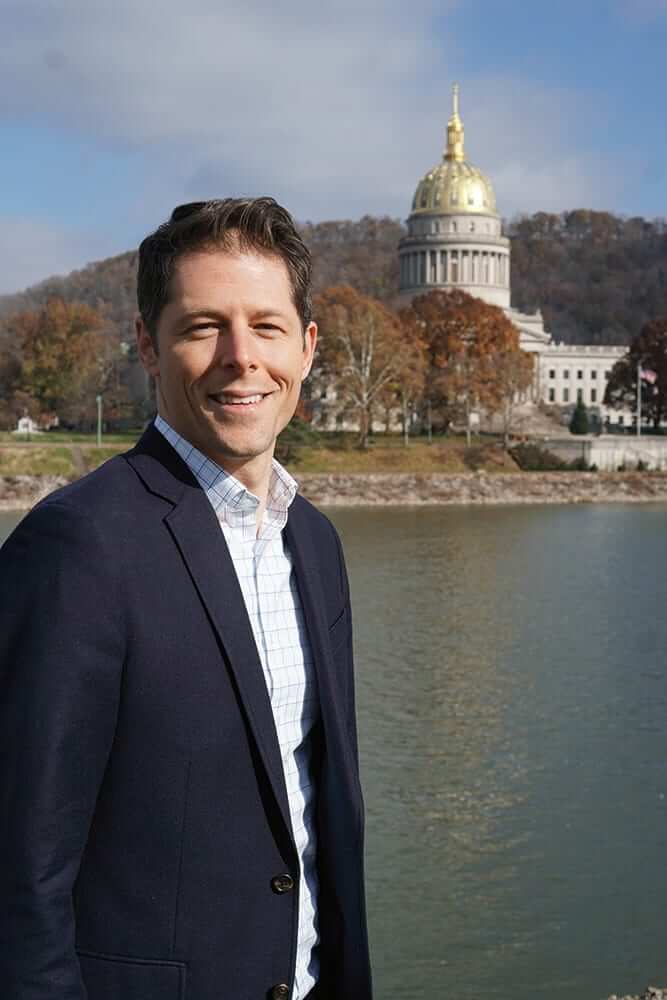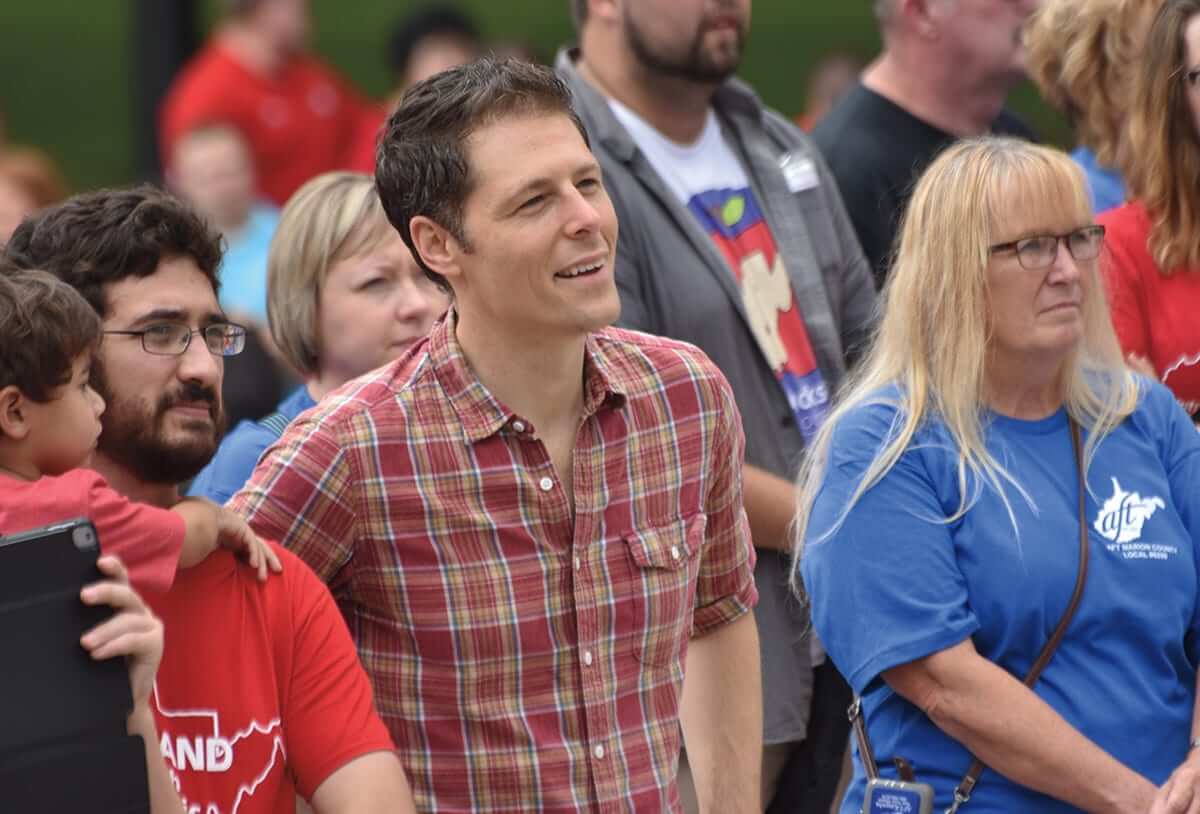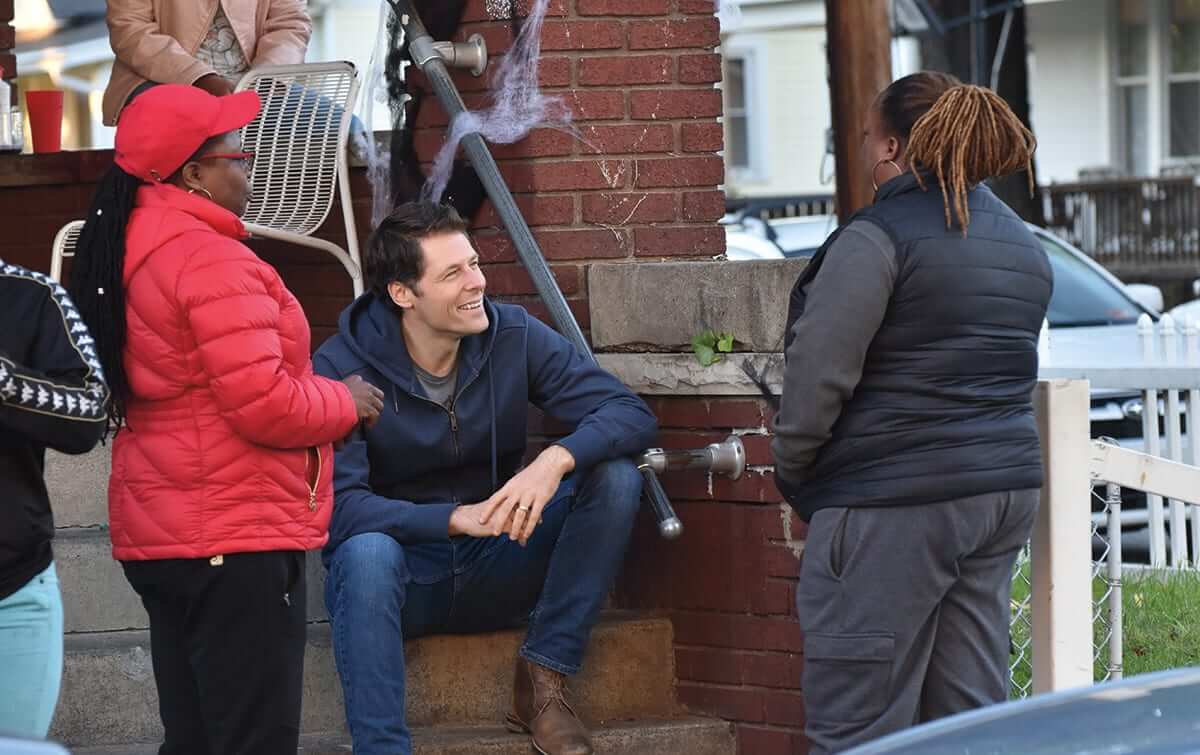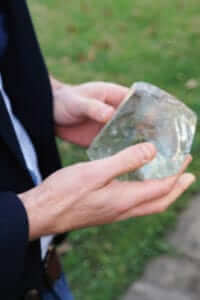For the past six years, Stephen Smith helped West Virginians help themselves. Then he quit his job as executive director of the West Virginia Healthy Kids and Families Coalition to take that mission to the next level.

It’s not that he’s ungrateful. He made clear that he very much appreciated the honor. It’s just that he felt there were others who deserve the honor more than him.
Smith had some ideas for an alternative. He suggested we pick someone from last winter’s teacher and school service personnel strike, or the Communication Workers of America strike that followed soon after. He also suggested we highlight one of the several women who won a seat in the state Legislature in November. “There is something happening in West Virginia right now,” Smith says.
His suggestions are good ones. Some of the people he mentioned have already made it into the pages of this magazine, as readers of last issue’s “Wonder Women” list are aware. And Smith is correct—something is happening in West Virginia. But that is exactly why we had to respectfully ignore Smith’s refusal.
Something is happening in West Virginia, and Smith is one of the reasons.
* * *

When it came time for college, Smith went off to Harvard, where he studied sociology but also became involved in a campaign to pay the university’s service personnel a living wage. After graduation, he became the director of an immigrant rights organization in Chicago.
But when he and wife Sara decided to start a family, they agreed they did not want to raise their child in Chicago. They also did not want to raise him or her in Sara’s native southern California. “We wanted to live in a place that cares more about who you love and who you serve than what you own,” Smith says. Returning to the Mountain State was a natural choice.
In September 2012, Smith became executive director of the West Virginia Healthy Kids and Families Coalition. The group had been founded more than a decade earlier by the West Virginia Council of Churches to support the creation of a Children’s Health Insurance Program in West Virginia. When that effort succeeded, the group shifted its focus to getting children enrolled in the program while also advocating for the program’s expansion to include oral care and prenatal care.
By the time Smith arrived, the coalition found itself in another period of transition. It had achieved its original goals. Where would it go from here? The group’s membership and board of directors opted for a bold move.
Under Smith’s leadership, the coalition launched several initiatives aimed at making West Virginia a healthier place. The Try This campaign debuted in 2014 with a goal of improving the state’s economy by improving public health. Instead of running a broad-brush statewide campaign, Try This gave individual communities the power to decide what they need most.

The Try This campaign has now handed out more than 300 mini-grants across the state. Communities have used the grant money to start community gardens in Boone County, create walking trails in Hamlin, build boat ramps for kayakers in Morgantown, make Matewan a more bike-friendly town, and organize healthy cooking classes for kids and families in White Sulphur Springs, along with many dozens of other community-changing projects. And while the grants themselves are small—usually between $1,200 and $1,500—they are paying huge dividends. A study by West Virginia University found that, on average, every $1 communities received from Try This became $11 through in-kind donations, volunteer work, and matching funds. “No one in this state knows how to stretch a dollar more than someone who doesn’t have a dollar to stretch,” Smith says.
Another West Virginia Healthy Kids and Families Coalition initiative, the Our Children Our Future campaign, has made impressive progress at the statehouse. This group is made up of more than 150 churches, community groups, unions, and other partner organizations across the state. The group has scored 28 legislative victories to date. These include raising West Virginia’s minimum wage and pushing lawmakers to pass the Feed to Achieve Act, which made it easier for county school systems to use federal funds to make school breakfast and lunch free to all students in high-need districts. “We now have the strongest breakfast program in the country,” Smith says.
Perhaps no one has been helped more by the work of Smith and his colleagues than West Virginia’s children. Our Children Our Future got involved in 2014 when Governor Earl Ray Tomblin’s proposed budget would have cut $1 million in services for children. The group put together a report showing how much damage the cuts would do and brought its membership to the Capitol to lobby lawmakers face to face. The Legislature restored the funding—only for Tomblin to cut the funding again using a line-item veto. But when the governor called the Legislature back for an unrelated special session, Our Children Our Future again rallied at the Capitol and got lawmakers to add the funding back to the budget. This time, Tomblin signed it into law. “Beware of West Virginians who are united in a fight for their kids,” Smith says.
As with the Try This campaign, these policy initiatives do not start with Smith or anyone else in the coalition’s leadership. Before each legislative session, Our Children Our Future members from all over the state nominate legislative priorities before the group chooses its agenda democratically at an annual policy summit.

Under Smith’s watch, the coalition has started other initiatives aimed at providing budding entrepreneurs with seed money to get started, training new candidates to run for office, encouraging church congregations across the state to eat healthy and exercise together, providing racial justice training to police departments in the state, strengthening the public education system by getting parents more involved in their children’s schools, and inspiring teenagers to get involved in the leadership of their communities.
With each program, Smith has been there to help get things going and keep them moving, but he’s always careful to stay in the background as much as possible. He wants communities to drive the progress of these initiatives, and he wants the people in those communities to be the faces of the movement.
It goes back to one of his core principles, something called the “iron rule of organizing,” which says “never do for someone what they can do for themselves.”
Smith wants to be an ally, using his skills and influence to support the work of others. He does not want to become the face of any movement, because that usually doesn’t work very well in the long term. “You don’t get a Civil Rights movement led by white folks. You don’t get a women’s movement led by men. You don’t get an LGBT movement run by straight folks,” Smith says. “The people who are hurting the most are best equipped to heal their own pain.”
* * *

But then, during our first interview with him—before he knew about the award and still thought this was a regular feature story—he revealed a surprising tidbit. He would be leaving the West Virginia Healthy Kids and Families Coalition in late November 2018, turning the reins over to the capable hands of new executive director Jennifer Wells.
Naturally, we asked what Smith would be doing next. And this revelation was more shocking than the first.
Stephen Smith is running for governor of West Virginia in 2020. He began hosting kickoff events around the state in late November and will officially launch his campaign on January 5, 2019.
This raises an obvious question. Why would a person who has spent the last six years trying to improve the state while staying behind the scenes suddenly decide to seek the state’s highest office?
It’s simple. Smith says at the coalition, he and his team spent most of their time fighting to make sure politicians didn’t make life in West Virginia worse. Now, he wants to see politicians make the state a better place to live. “The person who has the most ability to do the most good is the governor,” he says.
He has not abandoned his commitment to grassroots organization, though. Smith is planning a gubernatorial bid unlike any in West Virginia history. His campaign hopes to recruit 100 people to run for down-ballot offices on the same platform. That will allow the campaigns to share resources—volunteers won’t be doorknocking for just one candidate, but for a whole team of like-minded office seekers. “It’s a whole lot easier to run together,” he says.
But even more than that, Smith believes that this approach has the potential to effect significant change in state politics. “Never in American history has one politician made the difference,” he says.
Smith believes that, by working together across many different levels of government, he and his fellow candidates could effect lasting change in West Virginia. “Some state will be the first to offer free universal broadband internet access. That could be us,” he says. “Some state will be the first to rewrite its tax code to favor small businesses instead of multinational corporations. That doesn’t even cost any money. That could be us.”
His campaign for governor will be unconventional in other ways, too. He has pledged that, for every $10 donated to his campaign, $1 will be given back to community improvement projects around the state. Smith sees this approach as a way for his campaign to do some good in the state long before Election Day.
What kinds of projects would the money be used for? Well, that would be up to the individual communities, of course.
* * *
Sometimes, when Smith is walking through the yard behind his modest but tidy Kanawha City home, he feels something sharp poke the bottom of his foot.
He’s not alarmed. He knows what’s going on, and knows what to do. He bends down, digs around in the soil, and pulls the object from the earth. It’s a jagged chunk of heavy glass. Smith cleans it off and places it on a patch of gravel beside his garage, in a row with about a dozen other glass blobs he’s pulled from his yard.
The land where Smith’s house now sits used to be home to a glass factory, back in the days when West Virginia was full of glass plants providing good, middle-class jobs. Somehow, when that factory was demolished, big melted chunks of glass got buried in the soil.
In the past half-century, nothing has come to the Kanawha Valley to replace the factories or the jobs they took with them. But the glass remained in the ground. It would have eventually reached the surface all by itself—although it might have taken years for that to occur. Smith’s assistance just allowed these beautiful objects to reach the light of day sooner.
Stephen Smith might not want to be our 2019 West Virginian of the Year. Yet there is no denying that, thanks to his hard work, there are movements taking place all across West Virginia that might have otherwise taken years to come to light. We are confident he will maintain this commitment to improving our state—whether or not his campaign for governor is a success.
Like the glass in Stephen Smith’s yard, West Virginia is already beautiful and full of potential. But, let’s face it, sometimes we need help brushing the dirt off.
written and photographed by Zack Harold









Leave a Reply